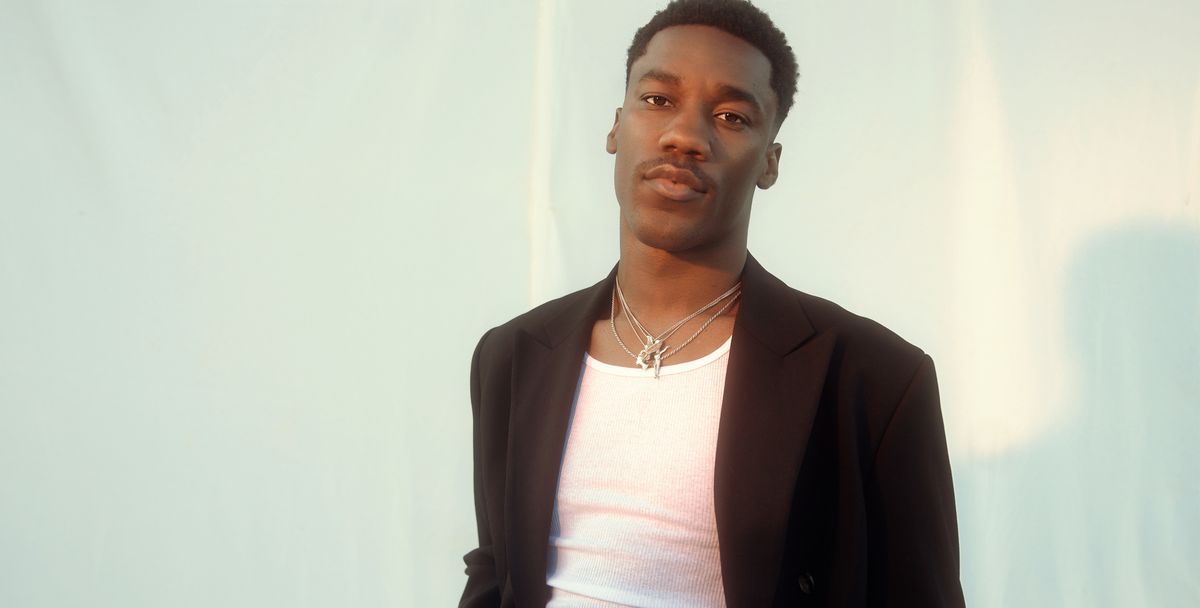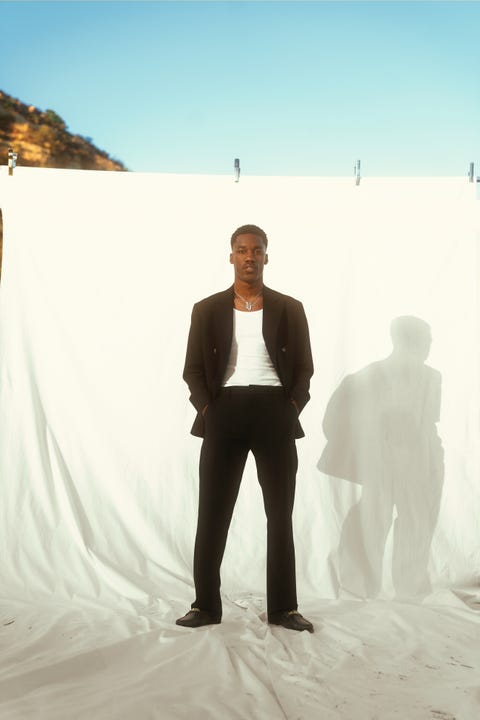For the first time since the pandemic forced the world into lockdown in March, Giveon finally has time to explore his new hobby: interior design. “I’m a minimalist, for sure,” he says matter-of-factly. His living room is his first project. “A couple homies saw Kanye West’s crib with barely anything in it and thought it looked weird. To me, it looks perfect. Clutter gives me anxiety.” Not only in his home, but his mind, too. Getting rid of mental clutter makes room for more peaceful and inviting thoughts, like reflecting on opening for Snoh Aalegra on her Ugh, A Mini Tour Again at the end of 2019; notching his first million streams with the sensual lead single “Like I Want You” from his debut EP, February’s Take Time; or earning his first feature, on Drake’s “Chicago Freestyle,” a month later. But then come the unpleasant thoughts that inspired his new EP When It’s All Said and Done, released today. Like the time he called an ex five times in a row (as recounted in the title track) or where he feeds his ego by comparing himself to an ex’s “downgrade” (standout track “Still Your Best”).
For someone who released two EPs in eight months—and in the middle of a global pandemic—you’d be forgiven for believing Giveon’s romantic woes are endless. Really, quarantine was a crash course in self-betterment for the R&B crooner, who spent his alone time sifting through emotions he pent up for years. “The way I write, I need to tell the true story,” he says. “I can’t just make a story up. So I have to let the things happen to me and allow myself to work through my thoughts.”
Instead of turning to a journal or public diaries like Twitter, Giveon hit the studio to record a four-track project updating fans on the cliffhanger from Take Time. Where his first EP dished a hearty entree of emotional pleas and painfully beautiful tales of love’s different phases, When It’s All Said and Done departs from some of those perennial themes. This time around, the loverboy is still there—but he’s talking shit.
Spilling over atmospheric coos and dreamy guitar strums, Giveon’s words carry the sting of a wounded lover who hasn’t come to grips with the end of the relationship. On “Still Your Best,” he sings: “This the one you talking ’bout that’s supposed to take my place down, is this for real?/ It’s almost disrespectful.”
This content is imported from Twitter. You may be able to find the same content in another format, or you may be able to find more information, at their web site.
Giveon assures me that he isn’t, as the Twitter youth would put it, a “toxic king”—that is, a man fueled by his own selfish desires, using destructive behaviors to compensate for his lack of compassion and self-awareness. “I have those toxic moments and then try to figure out how to fix that,” he says. If anything, Giveon believes he’s the empathetic one of his friend group, a trait he inherited from his mother.
Born Giveon Dezmann Evans, the artist grew up with his mother and three brothers in Long Beach, California. In high school, he participated in a music education program at the Grammy Museum, which introduced him to the sounds of fellow baritones Frank Sinatra and Barry White—“I started to embrace it and not run from it,” he says of his voice—and began entertaining the idea of pursuing a singing career. Listening to Frank Ocean and Miguel is how he shaped his “contemporary R&B” sound, and once he honed that, it was time to sharpen his songwriting style. He describes it like writing a drama: “I think of my body of work as a story that flows and plays in my mind like a film,” he explains. “In a film, there are dramatic moments and a bunch of different moments that lead up to a dramatic moment. On some songs, I try to paint the picture of before that drama happens, so by the time you get to the end of the project you’ve experienced infatuation and intimacy before it dives off to drama.”
Giveon prioritizes creative storytelling over the random musings of party tales, petty breakups, and ill-advised sexual encounters that fuel music today. Some stories are culled from his own experiences, others from his friends’ relationship woes. Around his brothers and guy friends, conversations veer superficial, rarely ever pivoting to the deep, sensitive topics of love and heartbreak he sings about. “My brothers and my homies, they’re not really in tune emotionally or vulnerable. If I was just around my brothers and guys all the time, I don’t think I would be able to write relatable, emotional stories the way I do,” he explains. Long chats with his mother were how he “learned to listen to women and understand how someone is feeling.” And so he built up a knack for vulnerable storytelling that captures the internal struggle between fragility and strength.
On his debut, Giveon deftly depicts the bewildering chaos of a relationship from honeymoon to breakup. “The Beach” presents the promise of a blossoming relationship, so long as his girl feels safe riding with him on the “eastside” of Long Beach, California where “it can get ugly.” “World We Created” finds the loverboy assuring his lady that despite her doubts and fears, he’s committed to her and “ain’t nothing or nobody that’s ever gonna break us.” He becomes stuck in an entanglement midway through the EP on “Favorite Mistake”—a song he didn’t initially intend to include but turned into a hit—as he secretly steps out on his current love for a situationship he knows won’t end well (it doesn’t). By the time listeners reach “Heartbreak Anniversary,” Giveon is picking up what’s left of his broken heart, foolishly building up his hopes that his ex will return. She doesn’t, but he hasn’t given up hope. Take Time outro “Vanish” offers the singer a moment of clarity as he finally realizes his actions caused the demise of his relationship. But he ends on an optimistic note: “I can be a hypocrite/I got stuff to work on/You got stuff to work on/But, we’re gonna, we’re gonna make it work/I love you.”
This content is imported from YouTube. You may be able to find the same content in another format, or you may be able to find more information, at their web site.
When It’s All Said and Done picks up where Take Time left off—Giveon is heartbroken, but he’ll never let his friends know that. “[The album] starts off with the mindset of I don’t need this person. I know I’m the best this person is ever going to get. Then, we move into me trying to get closure, but that closure ends up turning into accepting she’s gone forever,” he explains. Like the home he’s steadily decorating, Giveon favors sparse, airy melodies that never feel too crowded, giving his velvety baritone enough room to let his innermost thoughts come through. In the first moments of the intro, Giveon admits he called his ex multiple times to right his wrongs, but when asked by a friend if the relationship is really over at the end of the song, he masks his hurt by leading with his ego.
“When the EP starts, I’m frustrated, full of ego and pride, saying whatever,” he says. “It’s a bit cocky, but it’s a true intimate moment I remember from that time, and it made me think about the conversations I had with a lot of my guy friends. It’s kind of hard to accept that or move on from it. So the first song is a coping mechanism. You’re trying to cope with it by saying you’re going to be the best they had anyway. It’s their loss-type of attitude, but you’re hurt deep down inside,” he adds. But the real Giveon shows up when his friends leave his side and he’s left to confront his shortcomings alone in his room. With a phone ringtone serving as the transition from the ego-fueled “Still Your Best” to “Last Time,” a collaboration with Aalegra, Giveon peels back the facade and bears his soul as he cuddles with the same person he convinced his friends he’s done with.
About halfway through our conversation, Giveon has a confession to make. “I don’t think I’m ever actually alone,” he admits. “If I am alone physically, I’m FaceTiming with someone. I hate being by myself. I have separation problems, and this is my first time being by myself [in my life]. I hate it. I’m always talking to somebody and I always end up reflecting on these old stories when I’m alone.” Not to mention being in lockdown at home for months puts a magnifying glass on past situations and accelerated issues he says would’ve come up down the line anyway.
As we near the final song on the album, “Stuck On You,” the declaration Giveon made in the intro that, “I’ma be good when it’s all said and done,” seems harder to believe. He accepts that regardless of how bad he is for her and how damaging the relationship is for him, he’s too desperately in love to let her go for good. I call it toxic. Giveon calls it catharsis.
“These songs are about situations that happened six to eight years ago, so it’s a form of therapy to finally get it off my chest after all this time,” he says. “I want to be one of those artists who are openly honest and vulnerable. Being a savage person comes easy to some, but deep down I’m just not that type of dude. I’m out here mourning and heartbroken like the rest of us.”
This content is created and maintained by a third party, and imported onto this page to help users provide their email addresses. You may be able to find more information about this and similar content at piano.io


![When It's All Said And Done [Explicit]](https://hips.hearstapps.com/vader-prod.s3.amazonaws.com/1601660879-31rwQziHWwL.jpg?crop=1xw:1xh;center,top&resize=480%3A%2A)